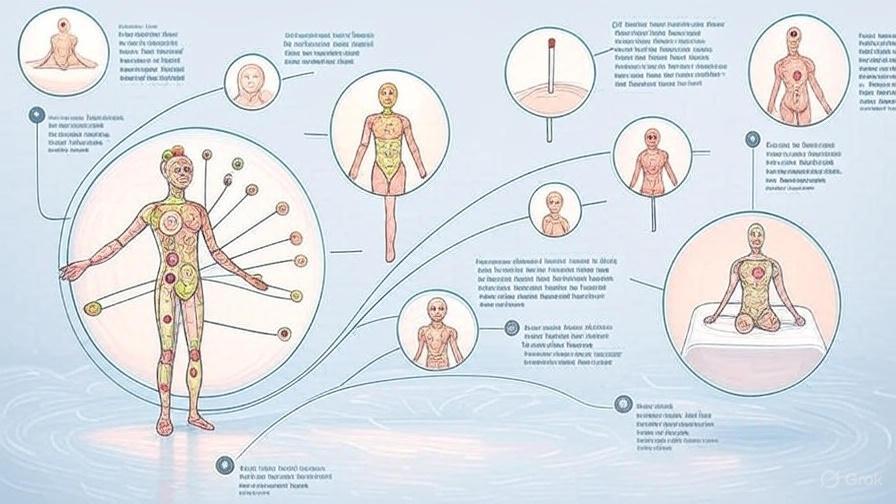The Science Behind the Needles: How Acupuncture Actually Influences Your Hormones

Hormones are the body's chemical messengers, a sophisticated communication network that regulates everything from our mood and metabolism to our reproductive cycles and stress response. When this delicate balance is disrupted, the effects can be widespread and debilitating, leading to a host of conditions from PCOS and thyroid disorders to persistent stress and sleep issues. While acupuncture is often recognized for its ability to relieve pain, a growing body of scientific evidence is revealing its profound and often overlooked impact on the endocrine system. I've seen firsthand how Acupuncture For Hormone Regulation can be a game-changer for many individuals. This article will peel back the layers of traditional wisdom to explore the fascinating scientific mechanisms by which acupuncture influences our hormones.
The Endocrine System: A Symphony of Hormones
The endocrine system is a network of glands—including the pituitary, thyroid, adrenals, ovaries, and testes—that produce and secrete hormones into the bloodstream. These hormones then travel to target cells and organs, where they initiate specific actions. The entire system is orchestrated by the hypothalamus and pituitary gland in the brain, often referred to as the "master glands." They receive signals from the nervous system and the rest of the body, then release hormones that stimulate or inhibit other glands.
Hormonal imbalances can arise from various factors, including chronic stress, poor diet, environmental toxins, and underlying medical conditions. The symptoms are often diverse and can include irregular periods, unexplained weight gain or loss, fatigue, mood swings, and infertility.
Bridging Traditional Wisdom with Modern Science
Traditional Chinese Medicine (TCM), the system from which acupuncture originates, has long understood the connection between energy flow (Qi), blood, and the body's internal functions. While TCM doesn't use the term "hormones," it has its own diagnostic framework for identifying imbalances that correspond with modern hormonal conditions. For example, a TCM diagnosis of "Kidney Qi deficiency" often correlates with symptoms of adrenal fatigue, while "Liver Qi stagnation" can manifest as PMS or irregular periods.
Modern science is now beginning to provide the physiological explanations for these traditional observations, revealing how the insertion of fine needles into specific points can influence the nervous and endocrine systems.
The Hypothalamic-Pituitary-Ovarian (HPO) Axis and Acupuncture
One of the most well-researched areas of Acupuncture For Hormone Regulation is its effect on the HPO axis, which controls the female reproductive cycle. Research has shown that acupuncture can directly influence the release of key hormones involved in ovulation and menstruation.
-
Luteinizing Hormone (LH) and Follicle-Stimulating Hormone (FSH): A study published in the journal Fertility and Sterility found that acupuncture can normalize the levels of these two hormones in women with Polycystic Ovary Syndrome (PCOS). By regulating the signals from the brain to the ovaries, acupuncture can help restore regular ovulation and improve fertility.
-
Estrogen and Progesterone: Acupuncture has been shown to modulate the production of estrogen and progesterone, helping to balance the menstrual cycle, alleviate PMS symptoms, and support a healthy uterine environment for conception.
-
Insulin Resistance: A significant number of women with PCOS also have insulin resistance. Research suggests that Acupuncture For Hormone Regulation can improve insulin sensitivity, which in turn helps to regulate hormonal balance.
The Adrenal Axis: Cortisol and Stress Regulation
Chronic stress is a major contributor to hormonal imbalance. When we are stressed, our adrenal glands release cortisol, the "stress hormone." While a normal response, prolonged high levels of cortisol can disrupt other hormonal systems, leading to weight gain, fatigue, and burnout.
Acupuncture's calming effect on the nervous system is a primary reason it's so effective for stress management. It stimulates the release of endorphins, the body's natural pain-relievers and mood elevators. More importantly, research has shown that acupuncture can down-regulate the sympathetic nervous system (the "fight or flight" response) and activate the parasympathetic nervous system (the "rest and digest" response). This shift helps to lower cortisol levels and restore the body's internal equilibrium. The ability to directly influence the stress response makes Acupuncture For Hormone Regulation a powerful tool for those struggling with adrenal fatigue.
Thyroid Health and Acupuncture
The thyroid gland, located in the neck, plays a crucial role in metabolism. Both hypothyroidism (underactive thyroid) and hyperthyroidism (overactive thyroid) are conditions of hormonal imbalance. While there is less direct research on acupuncture's effect on thyroid hormones specifically, clinical observations and emerging studies point to its supportive role.
From a TCM perspective, thyroid issues are often linked to imbalances in the Kidney and Liver meridians. Acupuncture For Hormone Regulation in this context involves selecting points that support these organ systems, improve energy flow, and reduce inflammation, which is often a component of autoimmune thyroid conditions like Hashimoto's. By regulating the body's overall state of balance, acupuncture helps to create an environment where the thyroid can function more optimally.
The Neurological Connection: The Hypothalamus and Pituitary
The scientific consensus is that acupuncture’s influence on hormones is largely mediated through the nervous system. The needles stimulate nerve endings, sending signals to the brain, specifically to the hypothalamus and pituitary gland. These master glands then send signals to the rest of the endocrine system, telling the glands to either increase or decrease their hormone production.
For example, studies using fMRI (functional magnetic resonance imaging) have shown that stimulating certain acupoints can cause a measurable change in activity in the hypothalamus and pituitary regions of the brain. This provides a clear, scientific pathway for how Acupuncture For Hormone Regulation can have a systemic impact on the body's chemical messengers.
Choosing Your Path to Balance
If you're experiencing symptoms of hormonal imbalance, Acupuncture For Hormone Regulation may be a powerful option for you. It is crucial to seek out a licensed and experienced practitioner who understands both the traditional principles of TCM and the modern scientific understanding of the endocrine system.
A qualified acupuncturist will conduct a thorough initial consultation, including a detailed health history, pulse and tongue diagnosis, to identify the root cause of your hormonal imbalance. They will then develop a personalized treatment plan that may include a combination of acupuncture, dietary recommendations, and herbal medicine. This integrated approach ensures that all aspects of your health are addressed, leading to more sustainable and effective results.
Conclusion: A Holistic Approach to Hormonal Health
The relationship between acupuncture and hormones is a fascinating intersection of ancient wisdom and modern science. What was once explained as the regulation of Qi is now understood to involve the complex interplay between the nervous and endocrine systems. Whether you are dealing with fertility challenges, the symptoms of PCOS, or the effects of chronic stress, Acupuncture For Hormone Regulation offers a holistic, drug-free approach to restoring balance. By working with your body's innate communication systems, acupuncture empowers you to take control of your health and live in greater harmony. Embrace this scientifically-backed, time-tested therapy as part of your journey to optimal hormonal well-being.







